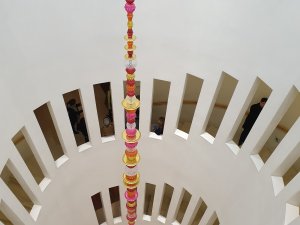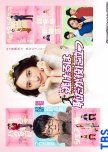If you are studying Japanese language or culture, this is the drama for you. I say that because not only is it an engaging story with well-developed characters and talented actors anyone could appreciate, or because of the piles of references to Japanese pop culture and television, but because this drama does something not many others do -- challenge.
"We Married for Job" paints some of the most prominent recent Japanese cultural phenomena including soushokukeidanshi (herbivore men) and bankon (getting married later in life) as well as older examples such as the role of women and men, the value/happiness of housewives, perception of homosexuality, oyakoukou (filial piety), work dynamics, collectivism and the stress of shuushoku katsudou ("job hunting") among others.
The most striking thing as a student would most definitely be "experiencing" those phenomena. No matter how much one reads or researches, the 'click' moment didn't come to me until watching this drama. Until now, herbivore men had been a mere concept - a niche group of strange men no-one knew about. After Hoshino Gen's endearing performance, however, I felt myself relate and connect to a lifestyle I always found myself unable to picture. More than anything, it was a refreshing take on Japanese society - the good, the bad and the ugly - that doesn't ever really get shown on television in a non-condescending way.
'Nigeru wa haji da ga yaku ni tatsu' not only depicts Japanese society freshly and without disdain, but challenges the everyday thoughts, relationship dynamics and ideals of the Japanese. A moment that particularly stood out for me was in episode one, when the character of Moriyama Mikuri contemplates the worth of housework as an occupation, and how her changing opinion on the monetary and meaningful value of housework changes in further episodes. Another particularly notable example for me was the character of Tsuzaki Hiramasa's ideas about homosexuals and how they change in a brief conversation. Most of all, the drama in essence, had the purpose of challenging traditional and changing ideas of "love". Marriage without love, love with someone you can't marry, the lines and blurs between relationships and the beautiful sentiment of loving ourselves, and allowing ourselves to love others.
As for the drama technically speaking:
CAST
Lovely cast fully of well-known and lesser-known professionals, who provided a diverse range of looks and personality to the show. I had high hopes for Hoshino Gen, and he really delivered in my opinion. Aragaki Yui is just as lovely as ever and never fails to impress. The side characters were also extremely impressive, though I won't delve into it.
SOUNDTRACK
I won't even touch Koi (the ending title, Love) because I think it speaks for itself. The rest of the soundtrack did however put me off a little. It was quite typical of a Japanese drama, which was relatively welcome, but the repetitious backtracks and instrumentals always turn me off a bit. It was no means bad though, and well used -- never a classic "where's the music??" realisation moment.
CINEMATOGRAPHY
Loved it. I'm no expert, but the TV-themed cuts were absolutely hilarious and really well shot as well. You really do notice a difference between drama and the other TV styles it depicts. I also thought the "hanky-panky" (as the subtitlers opted for) was interesting and rather cute. Nothing ever sore to the eye.
I really do love this drama - it is definitely one of the best I have seen objectively. I have my own tastes and favourites, but in terms of quality and just likeability as a drama, I really can't fault it. Anyone who is interested in watching it - try reading a little deeper and you won't be disappointed.
Was this review helpful to you?








